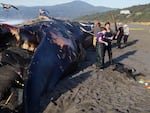
A new study of the effects of warm water on Chinook salmon found that fish tended to experience slower growth during warm ocean conditions (upper fish) and higher growth during cold ocean conditions (lower fish).
Oregon State University
New research
from Oregon State University and the National Oceanic and Atmospheric Administration this week
suggests a large patch of warm water off the West Coast could harm future salmon runs in the Northwest.
The study compared the effect of cold and warm water conditions on the eating habits and overall health of juvenile Chinook salmon.
OSU senior faculty research assistant Elizabeth Daly and NOAA Northwest Fisheries Science Center researcher Richard Brodeur studied salmon data from 1981-1985 and 1998-2011.
What they found was somewhat surprising: Young salmon eat around 30 percent more food in warm water conditions than cold.
“Our long-term data set contradicts the long-held assumption that salmon eat less during warm-water regimes,” said Daly.
But eating more didn't actually make the fish healthier. Instead, salmon tracked in the warm water years were smaller and skinnier than their cold water counterparts, possibly due to working harder for food that was less nutritious.
"The warm years typically have less upwelling that brings the cold, nutrient-rich water to the surface," Brodeur said. "Or in the case of 2005, the upwelling was so late that many of the salmon died because there was no food when they entered the ocean."
OSU and NOAA found an increase of just two degrees Celsius can harm the fish.
And that could spell bad news for future runs of salmon in the Pacific Northwest. Since the fall of 2013, scientists have been tracking a large warm water area in the Pacific Ocean, which they call "The Blob."

A blue whale washed up on a beach in southern Oregon after it died.
Calum Stevenson / Oregon Parks and Recreation Department
The Blob has been persistent, and
complete explanations of its causes have been elusive
.
But one thing is clear: It's not good for marine life. Crab and fish have become infected with domoic acid as a result of algae forming in the Blob, and that's led to poisoned marine mammals. Even the death of a blue whale that washed up on Oregon's south coast — a rare event — was attributed to the Blob.
The science journal PLOS One will publish OSU and NOAA's results this week.



